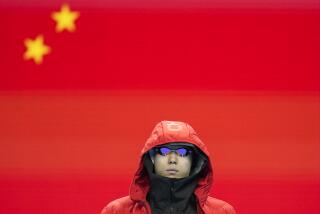IOC Proposes a Team Effort
- Share via
The International Olympic Committee, in a clear signal of urgency and import, proposed Monday that it work with the World Anti-Doping Agency to investigate the case of U.S. sprinter Jerome Young, who competed in the 2000 Sydney Olympics despite testing positive the year before for a banned steroid.
The case could mean the loss of the gold medals won by the U.S. 1,600-meter relay team in Sydney.
“In combining the experience and force of both organizations, the IOC believes that better results can be achieved,” the IOC said in a statement.
A clear indication of the matter’s significance is that IOC President Jacques Rogge issued the proposal as he appeared Monday at a ceremony in Beijing with senior Chinese government and leading Olympic officials to formally launch the marketing program for the 2008 Summer Games, expected to generate unprecedented Games-related business opportunities.
“The letter to WADA is a further step highlighting the importance that the IOC gives to this case,” the statement from the IOC said.
WADA President Dick Pound said in a telephone interview, “We welcome this continuing close cooperation with the IOC in the fight against drugs in sport. We will certainly be more than willing to help in this matter.”
The proposal for a joint inquiry was issued one day after Young won a second gold medal at the world track and field championships in Paris, anchoring the winning U.S. 1,600 relay. Last Tuesday, he won the individual 400 title.
In Sydney, Young ran the first leg in the opening and semifinal rounds of the 1,600 relay. He and five others won gold when the U.S. team, anchored by Michael Johnson, cruised to an easy victory in the finals.
Young, 27, of Fort Worth, acknowledged Thursday that he tested positive in 1999.
The next day, he said he had “never committed a doping offense” -- a distinction that stops well short of a denial that he was the unidentified Olympic gold medalist who tested positive before the Games, was initially found liable of a doping violation, then on appeal was cleared to compete by USA Track & Field. The hearing and appeal process was conducted in secret.
The case for years has fueled suspicions outside the United States that U.S. authorities were engaged in a coverup. U.S. officials say they were merely abiding by confidentiality rules, not furthering a coverup.
Without his successful appeal, Young faced the likelihood of a two-year suspension that would have kept him out of the 2000 Games.
Because the USATF hearing and appeal were conducted in secret, the International Assn. of Athletics Federations -- track’s worldwide governing body -- had no chance to review the case before Sydney. In nandrolone-related cases involving athletes from other nations, even those cleared by their national federations, the IAAF had acted to bar competitors from the Sydney Games.
In January, the Swiss-based Court of Arbitration for Sport ruled USATF did not have to disclose to the IAAF details of the unnamed U.S. athlete who competed in Sydney, or those of 12 other tests from 1996-2000.
Thursday, the day after The Times identified Young as the unnamed athlete from the Sydney Games, Rogge sent letters to the U.S. Olympic Committee and the IAAF “strongly urging” them to “pursue the matter.”
Pound, the WADA president, called Wednesday for the IOC to strip the U.S. 1,600 relay team of its medals because of Young’s 1999 test.
Rogge indicated last week that the matter is of “extreme urgency.”
He also said that the IOC stands ready to take “any measure or sanction against any person or party concerned depending upon the evolution of this case.”
More to Read
Go beyond the scoreboard
Get the latest on L.A.'s teams in the daily Sports Report newsletter.
You may occasionally receive promotional content from the Los Angeles Times.






